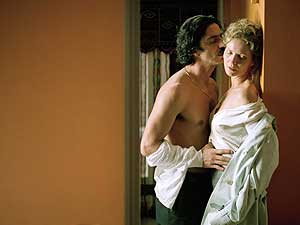|
Audio
Photos
|
July 15, 2005
Three-time Academy Award nominee Joan Allen has been in a succession of blockbusters in recent years. There's been "The Bourne Supremacy," "The Notebook," and "The Upside of Anger." But in recent weeks she's been talking about a much smaller film, about some very big issues. It's the latest movie by iconoclastic British director Sally Potter, who also wrote the script. It's simply called "Yes."
St. Paul, Minn. — On its most basic level, "Yes" is the story of a married woman having an affair. But we live in complicated times, and Joan Allen's character, who is never named, has a more complicated life than most. She's a scientist, in a loveless marriage with a high-ranking politician.
"And she is an Irish-born girl, woman, who at the age of 10 came to join her parents in America," Allen says. "So she is Irish and American, and she meets this Middle Eastern man and begins having this romance with him. And then over the course of time, as in many relationships, the cracks sort of start emerging and the cultural issues in this particular relationship come to the forefront."
Issues pile upon issues. He's a surgeon who has been forced to flee Beirut, but now can only find work in a kitchen. Religion butts heads with science, and international politics colors local realities. Characters argue over belief in God, and whose God, and whether there is a God.
The script takes on a combatative but lyrical sound. That is in part because Sally Potter wrote the screenplay in iambic pentameter, making it sound almost Shakespearean.
At one point, Allen's character, an embryologist, is asked by a panel to define when life begins. She tells them she knows they want scientific evidence, yet warns them it might not be that simple.
But wait a minute. Is this really true?
Could 'objectivity' be just a point of view?
We interpret what we see, and can see
What we expect in embryology.
When a man first saw a sperm magnified
He thought he saw a little man inside;
And those that looked were sure they could see
One too; so eager were they to agree.
Then there are the issues of other people piling on top of those. Ultimately it is hard for a viewer to come up with a major cultural, political or philosophical debate of the last decade which is not touched on at least briefly.
Joan Allen says director Sally Potter began writing "Yes" on Sept. 12, 2001.
"Because she knew there was going to be a lot of hatred and outrage flying around. And she thought, 'Well, what's the antidote to that? Oh! Love! I'll write a love story.'"
Potter began with one scene. She thought it was going to be a short film, showing an argument between a European woman and her Middle Eastern lover. The script expanded, but the scene is still pivotal to the film.
HE: Every time I make the effort, and I learn to rhyme
In your English. And do you know a word
Of my language? Even one?
You've read the Bible. Have you read the Koran?
SHE: Is this the reason you are rejecting me?
HE: Rejection? No, I don't reject,
But, yes, I do demand respect.
Allen says it's the moment in the film where it becomes clear that conflict is not insurmountable.
"I think the biggest thing to me more than anything was about listening. I don't know how else to say that. Listening to the other, trying to understand the other," says Allen.
The film has recieved mixed reviews. Some people love it, and recommend seeing it several times to catch the nuances. But some of the reviewers, notably in the New York Times and the New Yorker, have been less than glowing.
A particular bone of contention is the iambic pentameter of the dialog.
Joan Allen says she enjoyed working with Sally Potter on "Yes." Potter is one of the few female directors even in independent film, and Allen describes her as brave and creative.
For Allen's part, having completed five films in the last two and a half years, she is taking time to look for new projects. She says now she has a hankering to do a little more comedy.






